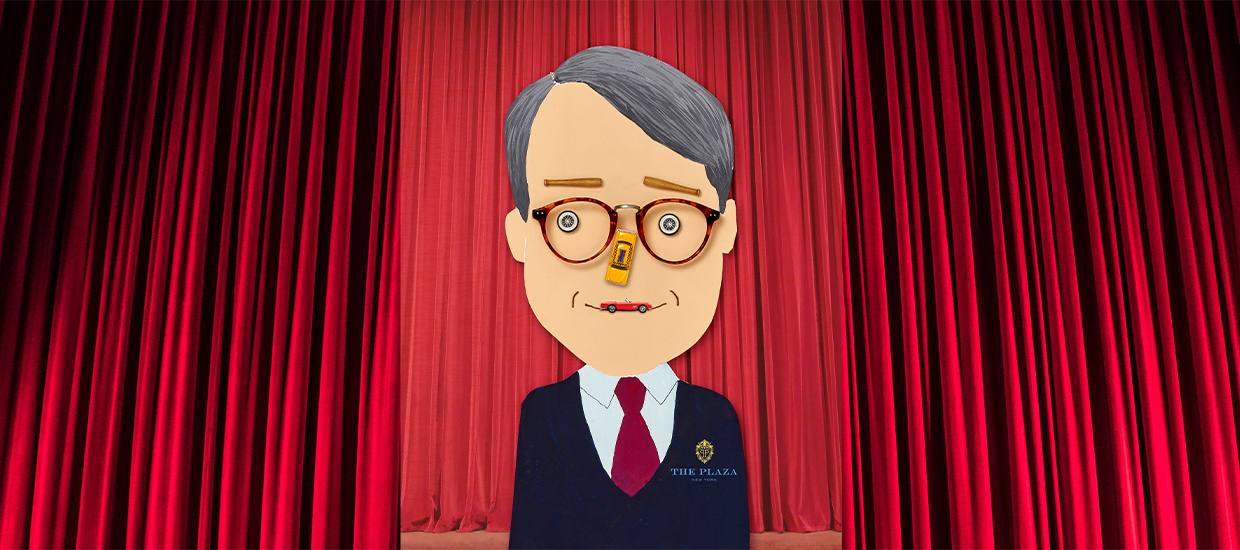The film star and Broadway veteran returns to the stage with a long-awaited revival of Plaza Suite
Matthew Broderick jokes that he’s lived in the same five-block radius his entire life—but it’s pretty much the truth. He grew up in Manhattan’s West Village and still lives in the neighborhood to this day, with his wife of 24 years, Sarah Jessica Parker, and their three kids. On an episode of his friend and fellow New Yorker Jerry Seinfeld’s show Comedians in Cars Getting Coffee, he quipped that should he ever write a memoir, the title would be Nothing Happened.
“Oh, did I? I don’t remember saying that!” Broderick says with a laugh, calling from—where else?—the West Village one chilly January afternoon. “I also thought of a book that I would write called I Regret Everything.”
Of course, plenty has happened for Broderick, and it’s difficult to believe he regrets any of it (well, maybe the 2006 flop Deck the Halls). He’s Ferris Bueller, Leo Bloom, even Simba! And, this spring, he’s tackling his 12th Broadway show, starring opposite his wife in a revival of Neil Simon’s Plaza Suite, two years after COVID shut down the production before it had a chance to open. Here, Broderick tells Hemispheres about Simon’s impact on his career, his upcoming Netflix series, and his secret to a successful marriage.
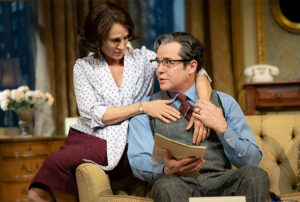
Broadway shut down the night you were supposed to begin performances of Plaza Suite. What was that like?
It was very strange. I mean, there were signs that it was coming. My memory is that the last few days of tech rehearsals, as we were getting closer to our first audience, things like hockey and basketball started closing. We had an invited dress rehearsal and we were in full-on costumes, wigs, everything, but about halfway through that rehearsal, I just kept seeing people murmuring out in the house. We were almost like, “I guess we’re going to keep pretending this is happening, but somebody’s going to tell us to stop.” And sure enough, the governor said stop. We all met out in the house, in the orchestra. We were told we’ll probably shut down for two weeks. That’s what they said. But we basically took off our little outfits, and two years passed.
In a way, bringing the show back to life must feel like stepping back in time.
I went to the theater a couple weeks ago, and my costumes are hanging right in the dressing room, exactly like it was. It was like a time capsule—like a museum.
Do you feel like you’re starting from scratch again, or is the play still in your head?
I think it’s still there. We’ve been doing a little bit of line rehearsal—we did some today, actually, just now—and I don’t remember it, but it doesn’t take me long to remember it. I think it’s in there, it’s just having to access it. I’ve done plays where I left and came back like a year later.
Right, like How to Succeed in Business Without Really Trying, back in 1995. You left and then came back the next year.
Yeah. Although that one, really, I think I left for about six months.
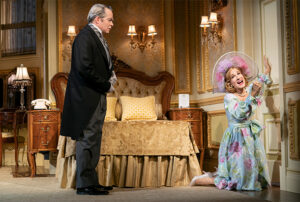
And when you came back you were starring opposite your future wife, Sarah Jessica Parker. That’s the last time you guys worked together. How different is it to do a show with her now?
That was very different, because I had done the show already and then left, and then she came in and did it with John Stamos, and then I came back and did it with her. We were kind of just tossed in together. This has been easier. Back then, it was a little bit of adjusting, like, “You’re doing this differently than I’m used to.” I remember some… not problems, but trying to figure out each other’s performance. But this time, we got to build it all together. So this has just been very easy, forgive me for saying. I’m sure it’ll get hard, but right now it’s been pretty much a pleasure.
There was this funny New York Times story in 1996, when you guys were doing that show, that described the two of you on stage together as “a pleasing, gratifying visual. Like, say, kittens, they make you look.”
Yeah, I remember that. He thought we were real cute. We were very embarrassed by that. I remember we were looking at houses at the time, and somebody said, “You want to look at this? There’s a 19th-century house in the village. It’s teeny, and it’s all made of wood.” And we thought, “No, we can’t be two little kittens in a little wooden house on Bedford Street, so we won’t do that.”
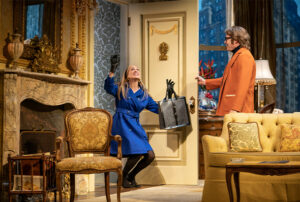
What was your biggest fear about doing this play with your wife?
What are the fears? The fear is that I don’t want [us being] a real couple to make you not believe the fantasy of it. I want it to be a believable play. So I always get scared that you might not get lost in the play enough. But as soon as we started it, I didn’t feel that. She’s such a wonderful actor and a wonderful comedian, and people maybe aren’t as aware of her stage chops. They really are something. I think it’s a real pleasure to watch her and be reminded of how good she is at that. As far as the personal, luckily we don’t seem to have gotten into any fights that bleed over from the practice into the theater, or vice versa.
Do you have strict rules on not bringing your work home with you—like no running lines over cereal?
I’m lazy. I don’t like to run lines ever anyway, so there’s no problem [laughs].
You made your Broadway debut in Neil Simon’s Brighton Beach Memoirs, and this is your fourth time doing one of his plays. What did you learn from him, either professionally or personally?
God, I don’t even know where to begin. My very first film [Max Dugan Returns] and my first Broadway play were with him. I had done one other play, but in Brighton Beach I was the lead. I hadn’t done that before. He was very involved. He sat at every single rehearsal, right next to the director. He didn’t really talk directly to actors, but if you tried something new, you would see him lean into the director’s ear. And then the director would say, “Don’t do that anymore,” or, “I liked that”—but you could tell it was coming from Neil. So, I learned everything from him, and nothing, since he didn’t directly tell me things. But his humor and his style of working is definitely how I learned. I got an instinctive feel, I thought, for how he liked things. And it was what I liked, too, so it was a great pleasure to work with his stuff. I also grew up watching the TV show The Odd Couple, which he didn’t write, but it was based on his play. Neil Simon was like an industry.
Yeah, when I was growing up I felt like our community theater was doing a Neil Simon play every year.
Well, there’s a million of them—and almost no clams.
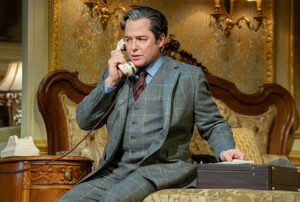
But the last time anyone did a real Neil Simon play on Broadway was in 2009. Was that part of the impetus for doing Plaza Suite now—wanting to introduce him to a new audience?
Well, I certainly would like that, but his plays will live on way beyond this revival, whether it works or not. But yeah, I’m aware of the fact that it’s been a little while, and that sometimes people haven’t been totally kind [to revivals]. Even when I did The Odd Couple with Nathan Lane, we met quite a bit of anger, or…
Resistance?
Yeah, resistance is a better word than anger, but… it was anger [laughs]. No, really. Sometimes these things sound derivative, but they’re really derivative from themselves. We grew up on stuff that came from them. Now you do them again, and they seem like they’re based on the things that were based on them. You have to realize, No, this was the first time. This wasn’t based on The Odd Couple. This is The Odd Couple. But I hope people are ready to embrace it again. It’s different now. When something gets a little further in the past, sometimes it’s easier to relate to it.
On the flip side, you’re also set to star in a very of-the-now Netflix series, Painkiller, about the beginnings of the opioid epidemic. You’re playing Richard Sackler, the former chairman of OxyContin-maker Purdue Pharma. Have you ever played a real person who’s still alive?
No, I don’t think I ever have. I’ve played people who are real but long dead. When I did that, I always thought, “Just look at it as fiction.” You just kind of make it up within the parameters of what is plausible. And I sort of approached this that way, too, because Richard Sackler—I don’t know him. I have no idea what his motives were. So I looked at it as a part in a teleplay. There are tapes of him being deposed, which I obviously watched. But not only did I not want to do an impression of him, I also didn’t want to pretend that I know what he’s like.
I can imagine that being challenging, but at the same time I think people nowadays are used to films or series about events that are currently happening. And I think we are more accepting of the actor having a take on the character.
Yeah, you’re right. It’s almost a new genre where you do these unfinished stories. There’s that Elizabeth Holmes [series on Hulu]—they were shooting that at the same time as us, and her trial hadn’t even happened. These are somewhere in between entertainment and news stories, I guess.
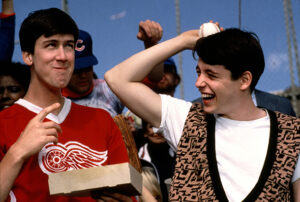
On a lighter note, last night I showed my 9-year-old son Ferris Bueller’s Day Off, which he loved, and today he tried to fake being sick to get out of school. Did you ever think that movie would have such staying power?
No, no. I had no idea. The only thing is, John Hughes was such a big shot at the time, so it’s not like I thought it was some quiet little movie. But that it would last? I absolutely never knew that, until the last few years. I can’t believe it did. I remember, when it came out, reading some really scathing reviews, even of me.
Really?
Believe it or not. So, when it came out, I was like, “What the…?” The News, the Post, and the Times, I think, were all pretty negative. I remember calling my agent, and I was like, “You told me this was a big hit! What’s going on?” But then it had a good opening weekend. I remember John Hughes was very proud that it was on the same number of 10-best and 10-worst movies lists.
That’s funny. OK, last question: I inter- viewed your wife back in 2016, when her show Divorce came out, and I asked for her best piece of marital advice. She thought for a very long time, and then she finally said, “Share the remote.” So, I have to ask, does she share the remote?
Definitely. She’s very good about that. Not only that, but she says, “Make this work.” Because in our modern world, the remote often doesn’t do what it says it’s going to do—something else goes on, or one thing turns off—so we have a lot of problems with that.
So, she shares it and you fix it. Is that the secret to a good marriage?
She shares it, yes. And I unplug it and plug it back in. That’s what I do. So my marital advice is unplug things and plug them back in.
Next Up: Your Guide to the Return of Broadway
